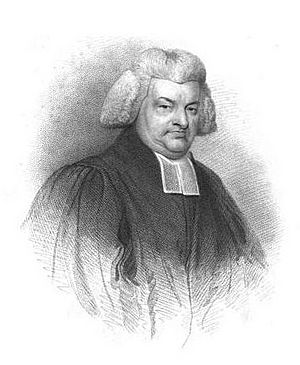William Bull (minister) facts for kids
William Bull (1738–1814) was an English Christian leader. He was known as an independent minister, meaning he led a church that was not part of the official Church of England.
Contents
William Bull's Life Story
Early Years and Learning
William Bull was born in 1738 in Irthlingborough, a town near Wellingborough in Northamptonshire, England. He was the third son of John Bull. William and his brothers and sisters were raised by their grandfather, Francis Bull.
William was very smart and loved to learn. He taught himself to read the Hebrew language. He also studied mathematics and even wrote for a math magazine called Martin's Mathematical Magazine.
Later, William left his job and moved to Bedford to live with his older brother, John. There, he continued his studies. He learned Latin from Reverend Samuel Saunderson and Greek from Reverend James Belsham. Reverend Belsham was the pastor of an independent church in Newport Pagnell.
In 1759, William Bull began studying at Daventry Academy. This was a special school for people who wanted to become ministers. Even though the school had different religious ideas, William stayed true to his own beliefs, which were based on Calvinism.
Leading a Church in Newport Pagnell
In 1764, William Bull took over from Reverend Belsham as the pastor of the independent church in Newport Pagnell. To earn more money, he also started teaching students. One of his students was Sir John Leach, who later became a very important judge.
Important Friends and Connections
William Bull became good friends with Reverend John Newton, who lived in Olney. They wrote many letters to each other throughout their lives. William Bull sometimes preached at a big house in Olney where John Newton held prayer meetings with the help of the famous poet William Cowper.
William Bull later became good friends with William Cowper. He even saved some of Cowper's poems. William Bull also encouraged Cowper to translate some poems by Madame Guyon into English. These poems were printed in Newport Pagnell, and William Bull wrote the introduction for the book.
While visiting Olney, William Bull met Mrs. Wilberforce, who was the aunt of William Wilberforce. William Wilberforce was a famous person who worked to end slavery. Mrs. Wilberforce introduced William Bull to her brother, John Thornton. John Thornton was a very kind person who gave a lot of money to help others.
Starting a Special School for Ministers
Around this time, some religious leaders wanted to start a new school to train people to become ministers. John Newton wrote a plan for this school. They asked William Bull to be in charge of setting it up. So, William Bull turned his teaching school into a special academy.
In 1782, he founded the Newport Pagnell Theological College, also known as the Academy. The school started with two students in 1783. It grew over the years and trained about 100 ministers. John Thornton mostly paid for the school.
Because of his connections with Mrs. Wilberforce and the Thorntons, William Bull also met other important people. These included Zachary Macaulay, Mr. Thomas Babington, Colonel Makelcan, and Major Handfield. These people were part of a group called the Clapham Sect, who worked to make society better, especially by ending slavery.
Besides teaching, William Bull often preached in London. He was also often invited to preach at the chapels of Lady Huntingdon, another important religious leader.
Later Life and Legacy
Even though William Bull lived a long and busy life, he was not always strong. In 1814, he became weaker and passed away on July 23. He was 76 years old.
William Bull, his son Thomas Palmer Bull, and his grandson Josiah Bull, all served as ministers in Newport Pagnell. Together, the Bull family served the town for 105 years.
William Bull's Writings
Books and Contributions
William Bull spent three or four years writing a book called Exposition of the Book of Psalms. This book explained parts of the Bible.
He also wrote a short guide called Seasonable Hints while traveling in Ireland. This guide was printed in Dublin and given out during his trip.
In 1775, William Bull helped with John Thornton's version of a book called Golden Treasury by Karl Heinrich von Bogatzky.
In 1811, William Bull and his son Thomas wrote a book together called A Brief Narrative of the Rise and Progress of the Independent Church of Newport. This book told the story of how the independent church in Newport began and grew.
William Bull's Family
In 1768, William Bull married a daughter of Thomas Palmer, who was from Bedford.
 | Dorothy Vaughan |
 | Charles Henry Turner |
 | Hildrus Poindexter |
 | Henry Cecil McBay |


